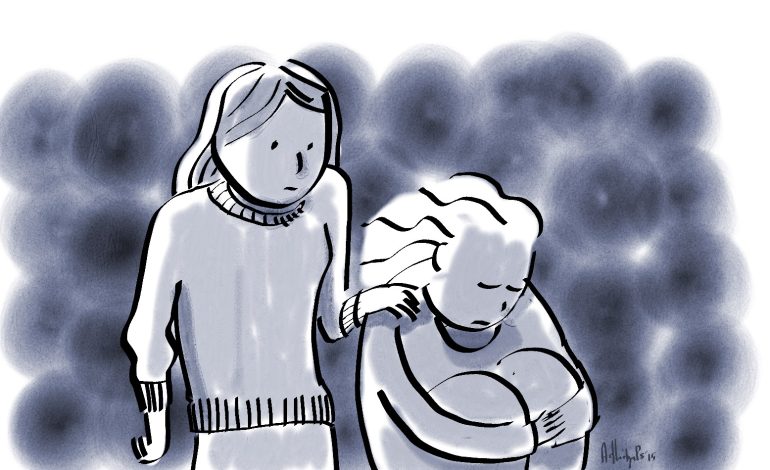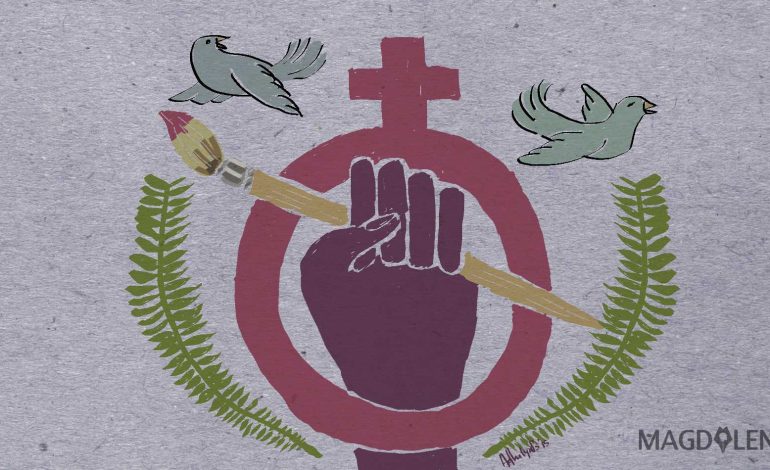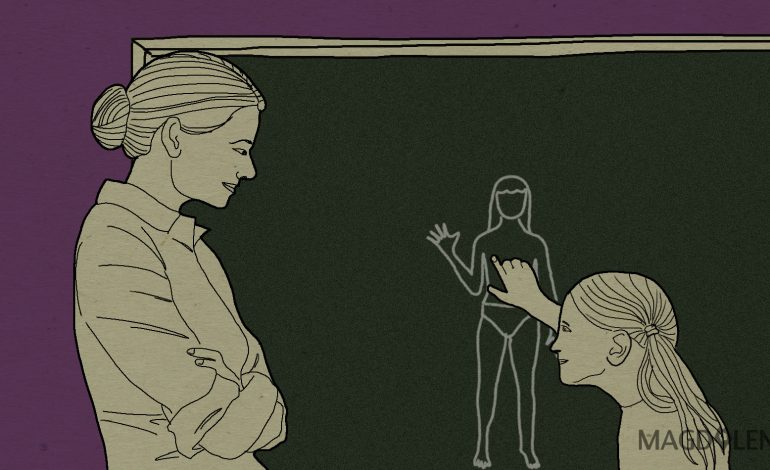Care and Empowerment, until They Stop Calling

On November 25 last week, one young woman stood out as the 16 Days of Activism against Gender-based Violence campaign began in various forms in the social media realm.
For a few hours that day, Shera Rindra became the voice of sexual violence survivors during a live question and answer session held on Facebook by BBC Indonesia. Shera answered dozens of questions on sexual violence and responded to hundreds of comments and remarks, including harsh ones that essentially blamed women for tempting men to rape them, many citing religious justifications. Some of the comments were considered too crude and offensive for public consumption and were immediately deleted by BBC moderators.
“I wish they didn’t do that, or at least that they had screen-capped these comments first before deleting them, so people could see that this is the reality we’re facing,” Shera told me when I met her a few days later.
I asked her if she had received a lot of hate messages or if she had felt threatened whatsoever since the Q&A session. She admitted that she had had a lot of friend requests on Facebook from strangers since then, and curiously, some of them with outwardly religious-looking photos or names, and that this spooked her a bit. We sat for an interview on her work break, during which she had to respond to a few phone calls from journalists.
“I kind of expected the haters, but I am worried that people will think I’m just doing this for the attention,” she said smiling, referring to the media’s sudden interest in her.
Having gotten to know her in the last year or so, it struck me how classically Shera this seemed, courageous and selfless, but in that typical Indonesian way, masking discomfort with a smile.
The Survivor
At 30, Shera has been through a lot, much more than most of her peers. She was four years old when a close relative began sexually assaulting her – assaults that continued for the next two years. Like most cases of child sexual abuse that involve people close to the family, this was never properly resolved.
In high school, her boyfriend slipped a drug into her drink to render her unconscious and raped her in her own home. As happens with many relationships between young people that begin with sexual violence, she never reported it. Instead she stayed in the increasingly abusive relationship, fearing the social consequences of being no longer “pure” and being alone. When she finally broke up with him – after catching him having sex with her own friend – her self esteem was so low, she did not realize that she was entering into another, even more abusive relationship.
But 12 years ago, when she was raped again by a different man, something changed in her. It was an up and coming TV actor whom she had dated briefly previously before finding out he was seeing four other girls at the same time. When about a year later he asked to visit her at her family home to patch things up, she made the mistake of meeting him outside her complex to show him the way in. She climbed in the car upon his request for a short drive to her home, only to find that there were two of his friends in the car. He sprayed something on her and later she woke up naked in a strange room.
This time she fought back, seeking justice with the support of her family and strong legal assistance and accompanied by women’s activists in a case that soon drew media attention. He was sentenced to five years (and got out in less than half of that), but not for rape, for an “indecent act” and for carrying drugs (he was caught with a joint).
But this was the start of her resolve to do advocacy work for victims of sexual and domestic violence.
The Caregiver
In 2011 Shera started being a caregiver for survivors of gender-based violence and since then she has accompanied alone 15 survivors of sexual and/or physical violence, and about the same number again jointly with other caregivers. The survivors she’s accompanied have been mainly women, and two boys, and some of them victims of incestuous rapes (including by their own fathers).
In Indonesia, where there is practically no tradition or official system of social service or government-supported carework, she has pretty much taught herself, adopting various methods such as the sponsor system of Alcoholics Anonymous, abortion counsellor techniques, and ideas from organizations such as the Pulih Foundation. She also brought her own experience and observations to these methods.
“I learned the best way to ask questions, to regulate my tone when speaking and to create rules and boundaries,” she said. The latter was important in order to empower the survivors.
The first thing she does when a survivor approaches her for help is to ask them whether or not they want to bring the case to court, telling them the risks of both options. If they decide to report to the police she immediately coordinates with institutions that provide legal help such as LBH Apik and Pulih. If they decide against pressing charges, she still accompanies them for health checks and treatment and helps with mediation with their families.
“The three phases are: caring for them, empowering them and helping them recover,” she said.
Interestingly, none of the 15 cases she has handled personally have been reported to the police (unlike some cases she has handled jointly with other caregivers). Though some survivors initially intended to report their cases, they changed their minds after having heard of the risks. The risks include being exposed to the media and having to go through a heavy and lengthy legal process with potentially high costs. Worse, they even face the risk of being sued by their attackers for defamation.
“Most of the people I have helped come from lower middle income families, and some are very disadvantaged,” she said. She doesn’t get paid for the work and she even has to cover some of the costs.
“In many of the cases the survivors become poorer, particularly in rape cases where the perpetrator is a family member, where the victims may get banished by their family.
The Challenges
In the last week alone, Shera has received five cases of sexual violence, including gang rapes, though she did not take all of them.
“I think I might be a bit burned out, so I try not to overstretch myself,” she said, adding she usually refers cases she doesn’t take to other caregivers.
Being a caregiver often means finding herself entangled in family dramas that involve a lot of ego, she said. Furthermore, there are often differences in principles and rules of engagement between her and her fellow caregivers.
“I try to be friendly, but I don’t want them to be dependent on me. Like, I make sure that we always meet at a neutral place, and I set certain time when they can contact me – outside of that time, they can only contact me if there is an emergency.”
“Some caregivers believe we should be the survivor’s best friend, but that often creates dependency, and it doesn’t empower them at all. Some people would call at 2 a.m., or even ask us to top up their phone cards.”
But this is nothing compared to dealing with the law, which makes her sick to her stomach sometimes, she said. When a victim reports sexual violence to the police, they are often treated disrespectfully.
“They’d ask questions like, ‘how could you let yourself be raped?’ or ‘how many boyfriends have you had?’, as if it was the victim’s fault. They even do this to underage victims and those who were raped by their own relatives. The worst thing is that even police women act like this,” she said.
This, despite the presence of a special division in the police force to handle violence against women and children, and the fact that many officers have received training by the Women’s Empowerment and Child Protection Ministry and the National Commission for the Protection of Women (Komnas Perempuan).
Just as disturbingly, police often throw tendentious questions at the perpetrators, such as, “Why would you want to rape her?” as if trying to find a justification for their actions, she said.
“Listening to some of these questions, sometimes I’d have a flashback of my own case,” she said.
This blatant lack of gender perspective is even more apparent when the case reaches the prosecutors’ office, where violence victims are subjected to similar treatment. Sometimes the prosecutor does not even bother to communicate with the victims or their families, keeping them out of the loop throughout the case.
In some cases, like Shera’s own case 12 years ago, prosecutors conspire with the police to doctor the testimony in the dossier to make it appear as if the assault was actually consensual sex. This is the reason why so many cases of sexual assault end with the perpetrators getting punished for the lesser crimes of “indecent acts” or “mistreatment”, instead of rape.
So how does she know if a survivor has finally recovered from the trauma of violence?
“When they no longer contact me,” Shera said.
This is a process that takes from three to six months, or longer, she said. In the beginning a survivor may contact her a few times a day to vent about various issues, even those unrelated to the violence, such as work problems. As time passes the phone calls and texts grow less. She continues checking in on them regularly, but less so when she feels they are on the path to recovery.
This is different, however, when dealing with those who are victims of domestic physical abuse.
“I get strict with them and always check on them. Because sometimes when they no longer call, that means that they have returned to their abusive partners,” she said.
She wishes that someday she could open up a “one-stop” center that provided legal, health and social services to make it easier for survivors of domestic and sexual violence to seek help. The government recently established the Integrated Service Center for Women and Children (P2TP2A), which comes with 200 safe houses across the archipelago, but it is far from enough and their services are not as effective as those provided by non-profits like LBH Apik or Pulih or independent social workers like Shera.
There’s a long way to go to achieve this lofty dream, but I have no doubt she has the passion to make it happen.
Read here about the efforts to change legislation on sexual violence.






















